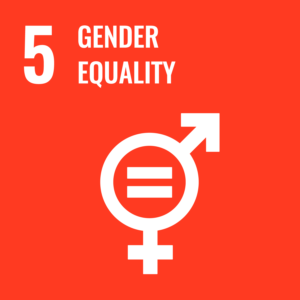SDG5: Gender Equality
The drive for gender equality globally remains an ongoing battle and is an area that the University of Northampton is fully committed to supporting. Our work in this area encompasses supporting females being taught in compulsory education and in higher education (both access and attainment), as well as equity for women in the workplace. We are also committed to preventing violence against women, and other forms of exploitation and harm. We are proud of our work at the University to ensure that we promote gender equality and actively support women in their lives and careers, and we deliver this through our community outreach work, our Access and Participation Plans, as well as our human resources work and staffing policies. This support also covers our work to assist charities and NGOs seeking to support women who have been victims of domestic violence.

Community & Outreach
The University is committed to supporting charities and third sector organisations working towards gender equality. During the ongoing Covid-19 pandemic, the University actively supported local charities working with women who are victims of domestic violence, to support them with emergency accommodation and resource requirements. The University has also supported our amazing students who are working towards solving a multitude of gender issues, including: female genital mutilation (Hidden Scars); representation on the United Nations (UN) Committee on the Elimination of Discrimination against Women (CEDAW); providing education for women in Malawi (United Amayi). Take a look at the work our students have produced around gender.
Our UniConnect work, delivered in partnership with the Universities of Hertfordshire and Bedfordshire, also seeks to promote higher education to young girls from disadvantaged areas, as well as promoting careers in STEAM. This is achieved through the delivery of workshops in schools (here is a list of all our partners), as well as careers events and campus visits and tours, and is embedded within a broader work on widening access for a variety of underrepresented groups delivered by our Schools and Colleges Liaison Team. Our work in this area has also led to the production of online learning resources for teachers to use in schools to promote engagement with education, including amongst women and young girls.
Finally, our Institute for Public Safety, Crime and Justice (IPSCJ) has supported improvements in magistrates’ awareness of vulnerable women in the criminal justice system, a population who are more likely to have a mental health problem and to have experienced abuse as a child or an adult.
Please check out our latest research for SDG5: Gender Equality